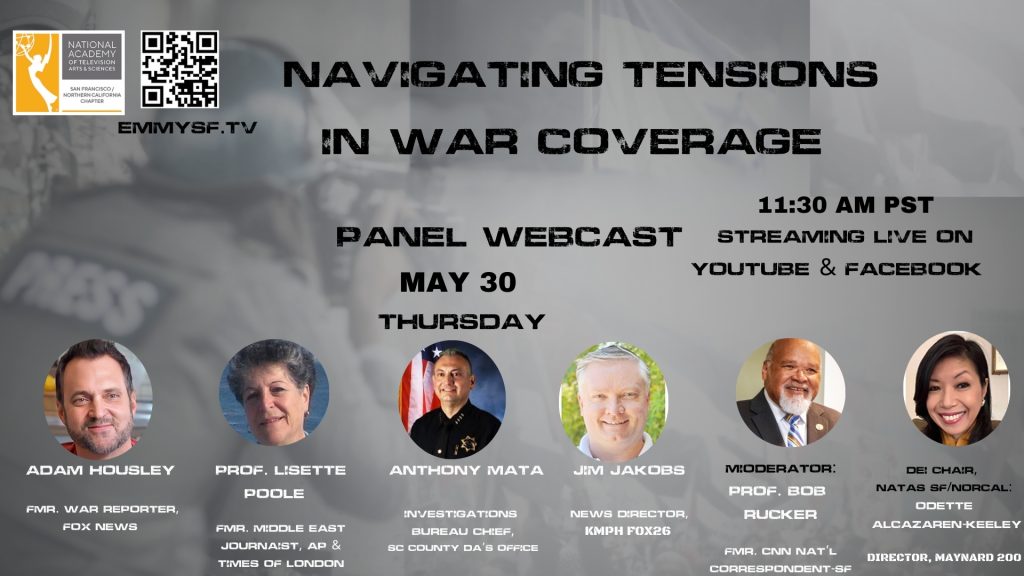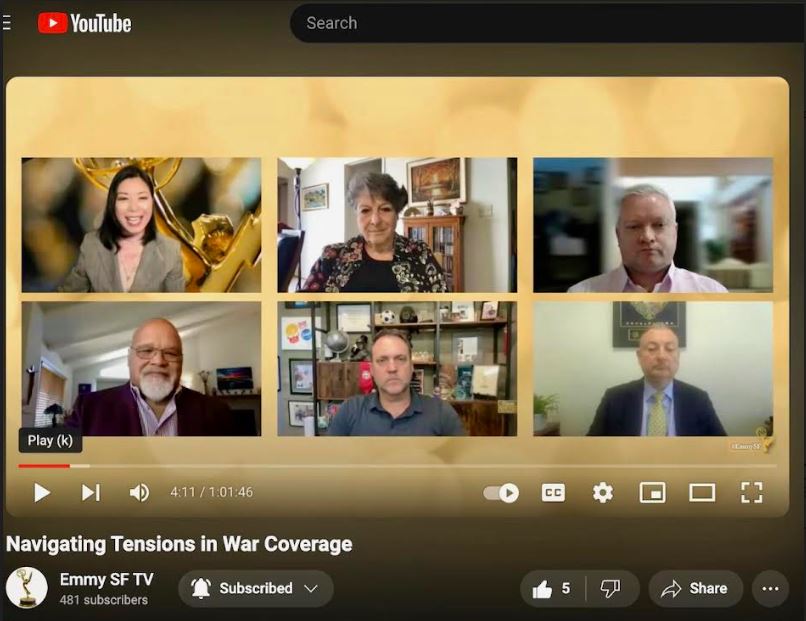The panel webcast, ‘Navigating Tensions in War Coverage,’ organized by the NATAS [National Academy of Television Arts & Sciences] San Francisco / Northern California chapter’s DEI Committee, featured the expertise and compelling perspectives of former veteran television war reporters, news and law enforcement leaders, through the lens of the ongoing conflict and humanitarian crises in the Middle East.
This, alongside reverberations at home, including tensions in America’s college campuses and newsrooms.
This latest digital dialogue event streamed live on YouTube and X last May 30th. It’s a follow-up to a previous virtual forum that focused on the dangers and psychological impacts of war reporting, presented by the chapter’s Diversity Committee last November 2023, in the wake of the onset of the Israel-Hamas War.
Speakers highlighted key checklists and frameworks to guide reporters, editors and producers in covering the multi-layered contexts, including historical, geopolitical, religious and others, of the conflict.
The panel event demonstrated the vital role of conversations that challenge ideas, but are grounded in respect especially for differing views, and in listening. These strengthen the national discourse on issues, and our democracy.
NATAS SF/Northern CA Board of Governors-DEI Chair Odette Alcazaren-Keeley opened the webcast sharing that this latest panel event is part of the ongoing initiatives of the chapter’s DEI Committee, delivering on its diversity, equity and inclusion mission. She explained that as before, this digital dialogue is anchored on DEI and Belonging, “as a pivotal framework that profoundly grounds a newsroom culture which steers journalists and news leaders towards inclusive coverage, in our primary journalistic mission of the relentless pursuit of truth. It sharpens the lens by which news is covered.” “It strengthens a coverage culture driven by accuracy, balance, cultural competency and respect for diverse perspectives. This includes the lens of journalists of color, whose work are focused on factually reporting on issues, but whose diverse gaze provide nuance and deeper understanding of issues,” she added.
Alcazaren-Keeley further explained that DEIB is seen as a “contributing force in building more powerful and nuanced storytelling. It is crucial in the coverage of war. One of the crucial roles of the DEIB framework is that it guides reporters, editors, producers and newsroom leaders in choosing sources, as well as voices that need to be balanced in covering issues, especially in conflict zones.”
Moderator Prof. Bob Rucker, former CNN National News Correspondent – San Francisco, highlighted key developments of the Israel-Hamas War in the past several months that have “created a shocking humanitarian and safety crisis… raising tensions and triggering global protests especially in America’s college campuses.”
He kicked off the discussion with former international war correspondents, Adam Housley, former war reporter for Fox News; and Lisette Poole, former Middle East Journalist for the AP and Times of London who had lived and worked in the region. They shared their respective experiences and guidance in line with covering the conflict, especially its myriad contexts. They shared why feelings on both sides run deep and fuel mistrust.
Jim Jakobs, News Director, KMPH FOX26-Fresno encouraged reporters to have discipline on research to gain deeper understanding on contexts, including relevant history of issues. This is one of his mentorship pillars as a journalism leader who also fosters the growth of the newer generation of media professionals in the station and for members of the NATAS SF/NoCAL chapter. Jim encourages early career journalists to read as much material as they can from a broad perspective and across the globe including the New York Times (Free access with library cards), BBC, NPR, and local online papers.
Jakobs shared a clip from one of their newscast’s recent reports, on a peaceful pro-Palestine demonstration at Fresno State University. This local perspective is vital to the dialogue across the country and runs counter to some of the national narrative that implies all the protests are the same. As this piece from Fresno shows, there were no takeovers of buildings, altercations, arrests or negative contact with police officers. It demonstrates the power local journalists still have in reporting on truth in communities outside of major cities.
Alcazaren-Keeley agreed, citing that KMPH’s news report is an example of the power of local journalism in bringing diversity to news coverage and the national dialogue on issues. It contributes towards the full picture behind the headlines, and also shows how people are expressing their sentiments, across cities and regions.”
Anthony Mata, Investigations Bureau Chief, Santa Clara County District Attorney’s Office and Former Chief of Police, San Jose, CA asserts that law enforcement members need to be “well-informed and well-tuned into what’s going on in the world because we can walk into something that could be a normal call, but not knowing the background or history can create some issues.”
Additional contributors to this virtual panel event via pre-recorded statements were: Talal Alenezi, who lives in the Middle East and works for the Ministry of Information in Kuwait. He has traveled the world and earned his masters degree in Mass Communications from San Jose State University. Alenezi says people in his country are alarmed and troubled by the growing humanitarian crisis in Gaza.
Trevin Smith, a San Francisco Bay Area native who first studied journalism at San Jose State University. In recent years, Smith earned his masters degree from Columbia University in New York, an epicenter of war protests in American college campuses.He offered thoughtful insights on the thinking of students there, and on the TV industry’s need to evolve its social media outreach, including using far more innovative approaches to reach young people.
During the discussion and her closing remarks, Alcazaren-Keeley, whose main post is Maynard 200 Fellowship Program Director of the Maynard Institute for Journalism Education, also shared that a resource training program that can aid in shifting newsroom culture, including coverage, management and collaboration, is the institute’s signature DEI and Belonging framework, Fault Lines®.
It emboldens news leaders to acknowledge and dismantle personal and embedded biases, prejudices that can influence the direction and content of news coverage. The fundamental question of this training: ‘Are you a dismantler of systemic racism?’ is centered on the main Fault Lines® of race, gender, sexual orientation, generation, geography and class, as well as fissures such as religion and politics.
Full Panel Roster:
- Professor Lisette Poole – Former Middle East Journalist, Associated Press and The Times of London / Journalism Communications Lecturer, CSU East Bay
- Adam Housley – Former War Reporter, Fox News, Former Reporter, KCPM NBC Chico and KTXL Sacramento /Former Board of Governors Member, NATAS SF/NorCAL
- Anthony Mata – Investigations Bureau Chief, Santa Clara County District Attorney’s Office / Former Chief of Police, San Jose, CA
- Jim Jakobs – News Director, KMPH FOX26-Fresno/ Formerly at KCRA, KOVR, Sacramento and KNTV, Bay Area /Board of Governors Member, NATAS SF/NorCAL
- Moderator: Professor Bob Rucker, Former CNN National News Correspondent – San Francisco, Journalism Professor and Director Emeritus, SJSU / Board of Governors Member, NATAS SF/NorCA
- Diversity Chair, NATAS SF/NorCAL: Odette Alcazaren-Keeley Director, Maynard 200 Fellowship Program, Maynard Institute for Journalism Education
Both Adam Housley and Lisette Poole recommended books during the panel event that they believe can provide additional insights to journalists covering the Middle East conflict. Poole added further resources included in this list:
War Without End: Israelis, Palestinians, and the Struggle for a Promised Land by Anton La Guardia
What Price Israel? by Alfred Lilienthal
- The Hundred Years’ War on Palestine. By Rashid Khalidi
- The Lemon Tree. An Arab, a Jew, and the heart of the Middle East by Sandy Tolan.
- In Search of Fatima: A Palestinian Story. By Ghada Karmi
- Out of place: A memoir. By Edward W. Said.
- I saw Ramallah. By Mourid Barghouti
- The biggest Prison on Earth. By Ilan Pappe
- Ten Myths about Israel. By Ilan Pappe
- Abraham: A journey to the Heart of three faiths. By Bruce Feiler
- Strangers in the House. By Raja Shehadeh
This panel webcast is a resource support to NATAS SF/NorCAL members, and is a news source as well to the broader journalism community and the public. Members and all those interested in the chapter’s DEI Committee work, can suggest future topics, share their insights or ask questions via the chapter president’s email address: brooks@emmysf.tv. In your email message please include the words: For DEI Committee OR Re: DEI Committee War Panel – so they can be relayed accordingly.


